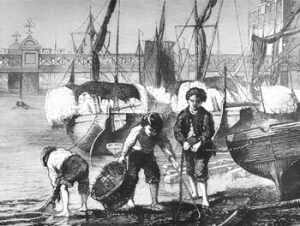
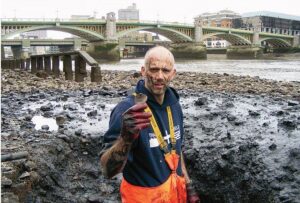 Not all age-old occupations are extinct. While we no longer need the knocker-up to make sure we are awake for work, due to the invention of the alarm clock, there will always be scavengers out there looking for lost treasure. Most of them probably don’t scavenge in the mud, but some do. It is a hobby that lots of people enjoy, but not exactly an occupation anymore. Nevertheless, there is money to be made doing it.
Not all age-old occupations are extinct. While we no longer need the knocker-up to make sure we are awake for work, due to the invention of the alarm clock, there will always be scavengers out there looking for lost treasure. Most of them probably don’t scavenge in the mud, but some do. It is a hobby that lots of people enjoy, but not exactly an occupation anymore. Nevertheless, there is money to be made doing it.
Originally, Mudlarking…or the scavenging of the river mud for items of value, was principally undertaken in London, along the river Thames. Most commonly, it was young boys from the 1700s to the early 1900s. While mudlarking would be a suitable way for young boys to make some money, the infatuation would not likely last very long. They could help their family make ends meet, it was no get rich quick endeavor. These days, mudlarking is simply a leisure activity.
In March 1904 author Dorothy Menpes wrote about London’s Mudlarks, her work published in the Batley 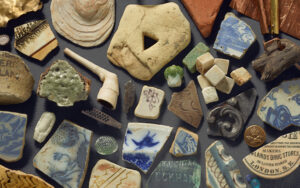 Reporter and Guardian, “Among London children are the mud-larks, the small scavengers of the Thames, generally clothed in scanty jackets, sunshine, and mud, wriggling unceasingly in and out of chains and anchors, and curling round the figureheads of the barges, never for one moment still, slippery and elusive as eels. They are very mischievous sprites, these children, always appearing where you least expect them, always ferreting about with those terribly keen black eyes of theirs, and frequently swooping down like seagulls upon some hidden treasure embedded in the mud; and their chief anxiety seems to consist in evading the Thames police. The Mudlarks of the Thames were a unique community, with a ‘language of their own,'” as Menpes details, “…it is a special mud-lark patois, and appears to be a mixture of the swear-words of sailors and the slang of landsmen. There are generally fights going on among these urchins for the possession of some treasure; and their constant enemies are the bargees, whom they delight to cheat and annoy by clinging to ropes and chains, thereby getting a ride gratis, as a street boy does on a Putney bus.”
Reporter and Guardian, “Among London children are the mud-larks, the small scavengers of the Thames, generally clothed in scanty jackets, sunshine, and mud, wriggling unceasingly in and out of chains and anchors, and curling round the figureheads of the barges, never for one moment still, slippery and elusive as eels. They are very mischievous sprites, these children, always appearing where you least expect them, always ferreting about with those terribly keen black eyes of theirs, and frequently swooping down like seagulls upon some hidden treasure embedded in the mud; and their chief anxiety seems to consist in evading the Thames police. The Mudlarks of the Thames were a unique community, with a ‘language of their own,'” as Menpes details, “…it is a special mud-lark patois, and appears to be a mixture of the swear-words of sailors and the slang of landsmen. There are generally fights going on among these urchins for the possession of some treasure; and their constant enemies are the bargees, whom they delight to cheat and annoy by clinging to ropes and chains, thereby getting a ride gratis, as a street boy does on a Putney bus.”
They would have to dig around in the mud looking for their treasures, because back then, they didn’t have 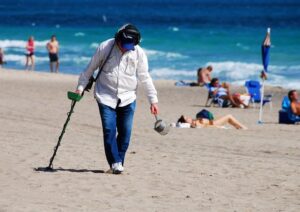
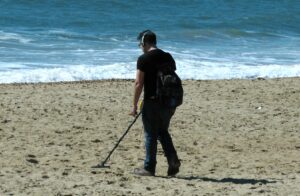 things like metal detectors. The Mudlarks (or scavengers) of today can simply walk along the beach, their yard, or the trail they are walking on to find possible treasures with very little effort. I suppose that the Mudlarks of old might say that the scavengers of today cheat to find their treasure, but as technology comes about, the game changes. It’s just the name of the game.
things like metal detectors. The Mudlarks (or scavengers) of today can simply walk along the beach, their yard, or the trail they are walking on to find possible treasures with very little effort. I suppose that the Mudlarks of old might say that the scavengers of today cheat to find their treasure, but as technology comes about, the game changes. It’s just the name of the game.


One Response to Mudlarking